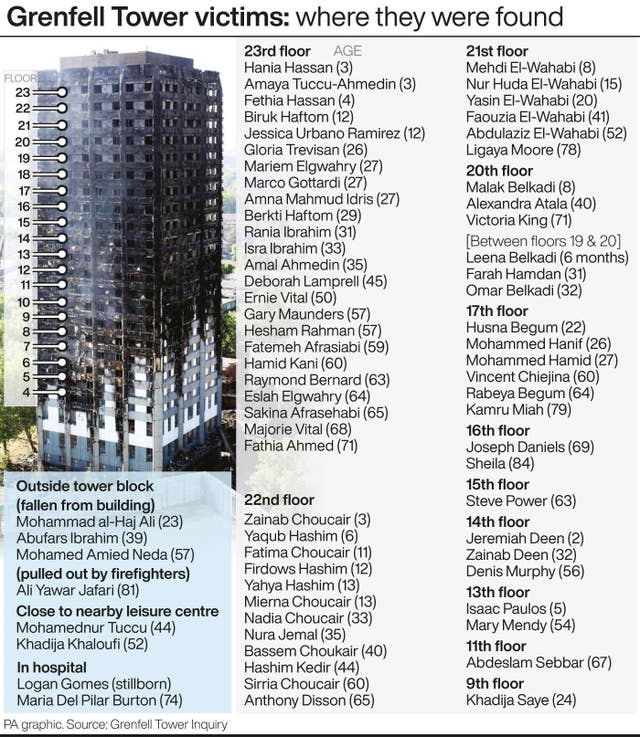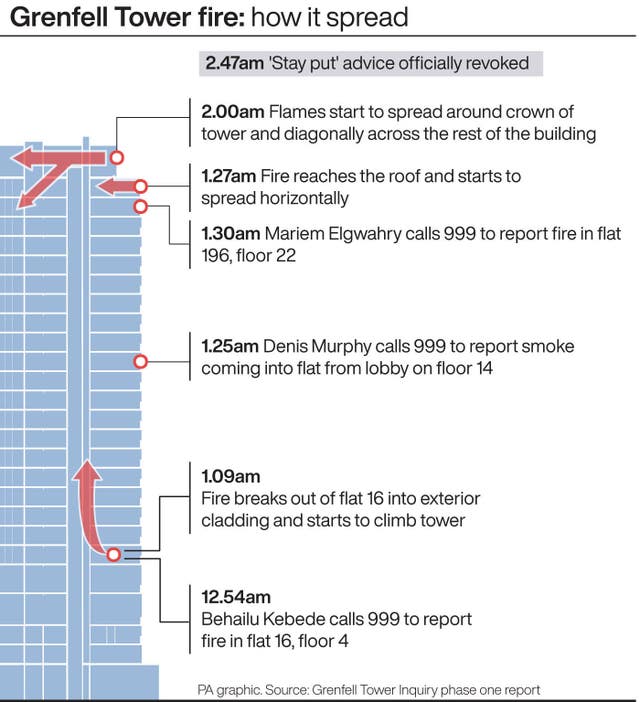
A senior official at the council that owned Grenfell Tower has told an inquiry that it did not occur to him to ask questions about the safety of the cladding proposed for the high-rise building.
Rock Feilding-Mellen, a former deputy leader and cabinet member for housing at the Royal Borough of Kensington and Chelsea (RBKC), had become involved in planning committee talks as the panel considered whether to approve a switch from zinc to combustible aluminium composite material (ACM) cladding in summer 2014.
A fire at the Grenfell Tower block in west London in June 2017 claimed 72 lives.

Mr Feilding-Mellen told the public inquiry into the blaze that he had given his “personal subjective opinion” about possible colours for the cladding in an effort get the stalled scheme to revamp Grenfell Tower moving.
The inquiry was told he expressed his thoughts about the colour – which included whether it should be champagne, neon lime green, a more pastel shade of green/turquoise and a deeper/darker British racing green, or battleship grey – but he did not ask about safety.
Mr Feilding-Mellen said it did not occur to him to raise questions about the fire safety of the panels while he was discussing what colour they should be.
This was because the talks at the time centred around a planning-related matter dealing with “the appearance and aesthetic question”, he said.
Mr Feilding-Mellen remembered opening an email from Laura Johnson, director of housing, in July 2014 containing safety guides and “skimming” the attachments.

He did not remember forwarding them on to any other councillors.
Asked whether receiving these guides had led him to consider the safety of the Grenfell Tower cladding, Mr Feilding-Mellen told the inquiry: “It did not. I cannot remember why that would have been.”
The council was the owner and landlord of Grenfell Tower, while the Tenant Management Organisation (TMO) was the body appointed by the local authority to run its housing stock.
Mr Feilding-Mellen said he felt he had “sufficient reassurance” from the TMO and housing officers that fire risk assessments and necessary follow-up actions were being managed properly.
Asked whether he had read the coroner’s recommendations following the fatal Lakanal House fire in 2009 at “any stage” before July 2014, Mr Feilding-Mellen told the inquiry: “Not that I remember.”
Six people died in the blaze at the housing block in Camberwell, south London, on July 3 that year.
Mr Feilding-Mellen accepted that he did not check through documents to see if there was anything he should do as a councillor regarding fire safety of a TMO building that was being refurbished.
“I failed to do that and, knowing what has happened, I regret having failed to do that,” he said.
Mr Feilding-Mellen said he thought there were “many layers of people” in place with the necessary expertise to check on the health and safety and fire safety aspects of a refurbishment project like Grenfell Tower.
He was also asked if he, as deputy leader, or anybody in RBKC thought there should have been an effort to double-check the TMO was doing everything it ought to ensure there was an emergency evacuation plan.
Mr Feilding-Mellen said: “I didn’t. I wish I had.”
He told the inquiry he would “probably be haunted” by the question of whether he should have done anything differently for “the rest of my life”.
“Based on the information that I had, and given what I considered my roles to be, I really don’t know what I could have done differently but I wish from the very bottom of my heart that things had been done differently so as to have prevented that fire, and that includes anything that this inquiry decides that the council, the cabinet or I should have done differently,” he added.
Mr Feilding-Mellen said the sorrow and pain he had endured was nothing compared to the bereaved and what must be their “unbearable grief”.
With his voice starting to break, Mr Feilding-Mellen said: “To those people, I want to say how really sorry I am.”
Nicholas Paget-Brown, who resigned as RBKC leader within weeks of the 2017 fire, recalled that Grenfell Tower had “quite a grim entrance,” no outside balconies and “it wasn’t a good piece of public realm”.
The inquiry heard the £10.3 million Grenfell Tower revamp was the biggest capital refurbishment project for a single property the TMO had managed by early 2013. It was also the first over-cladding project for a high-rise block the TMO had done.
Mr Paget-Brown said he did not take any steps to investigate if TMO executives, whom he thought of as housing professionals with appropriate CVs, knew enough about cladding a high rise to be able to hold their contractors to account in line with legal requirements and industry guidance.
Mr Paget-Brown added he was “surprised” that no one told him that a notice of deficiency was issued by the London Fire and Emergency Authority on Grenfell Tower in November 2016 after issues such as self-closing doors that did not work was spotted.
The hearing was adjourned to Wednesday at 10am.


Comments: Our rules
We want our comments to be a lively and valuable part of our community - a place where readers can debate and engage with the most important local issues. The ability to comment on our stories is a privilege, not a right, however, and that privilege may be withdrawn if it is abused or misused.
Please report any comments that break our rules.
Read the rules here